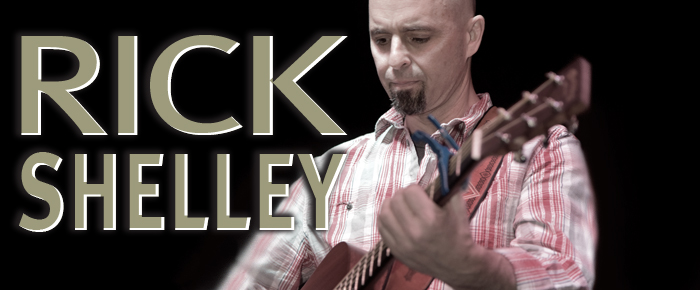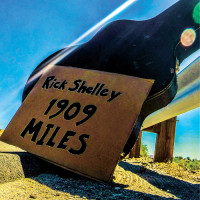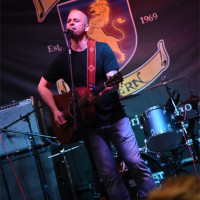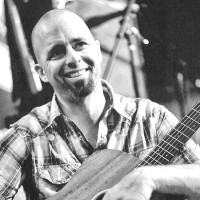
By Eleni P. Austin
Rick Shelley grew up a typical kid in Walla Walla, Washington. He played G.I. Joe’s, built forts, rode bikes he also spent a lot of time worried about Big Foot’s whereabouts. His father’s family had been farm workers who migrated from the south. A musical clan, Rick always heard stories centered around guitars and fiddles, a tradition that went back generations.
Born in 1967, Rick was very much a child of the ‘70s, and as such, a product of classic AM radio. That meant constant exposure to a variety of music. These days, it’s hard to imagine everyone in town tuning in to the same one or two stations. Now radio stations are ruled by niche marketing.
Back then, AM radio programmed everything. A song by Bread or Captain & Tennille might be followed by Led Zeppelin, War or Bad Company. Rick saved up and bought his first 7” single, “Southern Nights,” by Glen Campbell.
Although his dad had always played Country music and wrote poetry, Rick had never considered playing music until a cousin had left behind a pretty nice Gibson guitar. He and his older brother would surreptitiously “borrow” the guitar and try and figure out some chords, they both exhibited natural abilities.
When he started Junior High, Rick met James Danielson and Eric Turner; they all shared an affinity for Rock & Roll. By the time they hit their teens, Rick and James began to concentrate on guitar, Eric gravitated toward the drums.
During their high school years, the nascent trio cycled through a series of bass players and band names best forgotten. Rock & Roll stardom beckoned. As soon as they completed their studies they left for California.
Eric’s family had spent some time in Palm Springs, so it was more familiar, and less daunting than the sprawling metropolis of Los Angeles, the Walla Walla natives moved to the desert in the Spring of 1986. All three worked day jobs as they dreamed of a Rock & Roll future.
Equally inspired by Bob Dylan, Van Halen, the Kinks, Jimi Hendrix the Police, Stevie Ray Vaughan and Motley Crue, the guys began searching for the perfect bass player. When they met Nick Oliveri, it felt like all the pieces were coming together.
Nick had just quit his original project with Josh Homme, Katzenjammer. He added a Punk sensibility, introducing the Walla Walla boys to Iggy and the Stooges, the Damned and the Ramones. They began creating music together and RagTag was born.
By early 1989, they gigged wherever they could throughout the desert, building a solid following. Their sound was a Glam-Punk-Metal hybrid that could have shared the stage with Guns N’ Roses or Jane’s Addiction. As lead singer, Rick was particularly charismatic.
RagTag signed with a manager who promised big things and they quickly re-located to L.A. Despite the “pay-to-play” strategies of the Sunset Strip, the band still managed to play infamous venues like the Whisky, Gazzarri’s, the Roxy, the Country Club and the Troubadour. Ultimately, the manager couldn’t deliver as promised, and they imploded in the early ‘90s. For a while, Rick worked the lighting rig at the Palace in Hollywood.
Eventually, all four guys returned to the desert. Nick reconnected with Josh Homme, everyone knows that story. Rick, James and Eric married and started families, but the need to create music remained. By 1992 the guys recruited Nick’s brother Dean, a fine bassist in his own right, and began playing together.
Now in their mid-20’s they began incorporating new influences into their sound. The Jazz Fusion pioneered by Miles Davis, the improvisational spirit of the Grateful Dead as well as storytellers like Steve Earle and Townes Van Zandt, along with a plethora of Blues. These disparate styles made a profound impression. They spent hours sharpening their skills, so it only seemed fitting to name their band Woodshed, since woodshedding is a slang term for relentless musical practice.
Woodshed built their reputation playing live throughout California. They opened for everyone from L.A. Guns, Gene Loves Jezebel, Kip Winger, Tommy Tutone and the Untouchables. Rick was now on rhythm guitar and splitting vocal duties with James. Some songs stretched out like epic jams, others were lean and economical.
They quickly recorded two studio albums, Fires Of Spring in 1994 and Let It Roll in 1996. But it was their live album, Goodnight Irene, released in 2001 that truly captured the essence of the band. They recorded a fourth album at the influential Rancho de La Luna studio in 2004. It remains unreleased.
After 12 years together, the band had reached a plateau. Although they cultivated a healthy following, they still hadn’t achieved a commercial breakthrough. First Eric, and later James relocated their families back to Walla Walla. Woodshed effectively went on hiatus, never officially breaking up.
As the years flew by, Rick weathered a divorce, but remained a full-time dad to three amazing kids. As they got older he had more time to reflect on the vagaries of life. Slowly, the songs just came pouring out. In late 2014, he quietly began playing solo sets at clubs around town. He was even chosen to perform for Sony Music execs at a pre-Stagecoach event.
By now Rick had amassed an impressive arsenal of nearly 40 songs. He had recorded primitive demos for most of them layering in instrumentation and harmonies himself. After a gig at the Joshua Tree Saloon, the booker, Dave Ryan, (also a musician), suggested that he contact Chris Unck.
A multi-instrumentalist, Chris Unck has toured with Pink and Butch Walker, and fronts an excellent alt.country band, The Black Roses. He also finds time to produce other artists at High Lonesome, his recording studio in Joshua Tree.
Rick cherry-picked six songs from his vast catalog and began recording at High Lonesome in late August. The result is his just released EP, 1909 Miles.
The EP opens with “Walking With Ghosts.” Anchored by a click-clack rhythm, warm acoustic notes overlap with bittersweet electric riffs. The winsome track offers up a wry and empathetic character sketch of a long time club habitue’ who has seen better days. “She looked like I had remembered, more tattoos and a little less tender.”
The chance encounter lingers in his mind; “The memory of her followed me close behind, and even though there was little conversation, a lot was said with little hesitation.” The situation prompts him to reflect on his own misspent youth; “When you’re young, you owned the town, time took over and took you down/Disappeared without a sound.”
Two tracks, “25 Mile An Hour Town” and “Northwestern” return Rick to his Washington roots. The former is tethered to a cantering gait, accented by fiddle and loping acoustic guitar. Here we meet the teenage Rick, anxious to leave his hometown behind for some big city excitement; “It’s a world away from anything on Friday night, Dreams seem to run away as fast as they come in this 25 mile an hour town.” Over the instrumental break, ringing, Byrds-ian acoustic riffs cascade over the melody.
The latter was inspired after a night of music up at Pappy & Harriet’s. Looking up at the bright constellation of stars he flashed back to a galaxy far, far away: Walla Walla. Tentative acoustic chords and Rick’s plaintive tenor give way to a propulsive, Stones-y groove.
Spiky electric riffs slide through the melody as he tries to make peace with the quiet town that couldn’t contain his dreams; “…I was young and I was restless, couldn’t wait to get away on my own.” Honeyed acoustic arpeggios shimmer as he searches for redemption “I’m still searching for the words I can say, or a road I can get on that’ll lead me back someday/Hope it all comes together before it fades away.”
“Lifted” is an infectious charmer. Powered by a caffeinated shuffle rhythm, the melody and instrumentation recalls the Gypsy Jazz of Django Reinhardt. Self-deprecating lyrics allow Rick to lay his carnal cards on the table. “I’m looking to get lifted, picked up or stolen by a woman that looks real fine/With eyes like heaven and a wicked story line and a walk that’s like keeping time.” A tart, finger-picked guitar solo underscores the song’s playful mood.
The title of the EP, 1909 Miles refers to the distance between Nashville and the desert. On “Outskirts Of Nashville” Rick daydreams about his music making a splash; “One day I’ll go play at the Bluebird, real pretty and make them cry.” From the Cash-tastic “boom-chicka-boom” back beat to the swoony pedal steel that swoops, glides and weeps through the melody, the track manages just the right amount of Music City verisimilitude.
The EP closes with “You’d Be Better Off.” A tender mea culpa propelled by a measured beat, circuitous acoustic guitar and a classic Country Western fiddle that acts as a rueful Greek chorus under Rick’s aching regret. Taking full responsibility for a failed romance, he confesses “I didn’t mean to take your dances, or the way that you held close.”
Acknowledging his shortcomings, he offers rueful encouragement; “You’d be better off with a good man, one that’s steady, one that’s true/One that’s ready to love again but that ain’t me cause I’m a fool.” It’s a wistful end to an accomplished set of songs.
Rick produced the album with Chris Unck, who also played dobro, bass and electric guitar, (including the sparkly solo on “Northwestern”). He also relied on the crack musicianship of Bobby Furgo on fiddle, Bill Maresh on pedal steel and Brian Meuse on drums.
Arriving in California nearly 30 years ago, Rick’s dreams of Rock & Roll stardom in the land of hairspray and spandex didn’t exactly pan out, but he was smart enough to re-calibrate his goals. The Woodshed years were filled with great music and fraternal camaraderie. Striking out on his own was a scary proposition, but he rose to the challenge. He has definitely grown as an artist. His lyrics are rich and nuanced, borne from personal experience. His melodies are sharp and concise.
1909 Miles is the perfect introduction to Rick Shelley’s music. The only downside is it’s over after six songs. The listener’s only option is to program the CD player to “repeat” until his full-length album arrives.















































